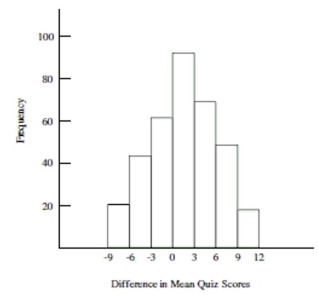Multiple Choice
Use the following information to answer the question. Math self-efficacy can be defined as one's belief in his or her own
ability to perform mathematical tasks. A college math professor wishes to find out if her female students' math self-efficacy
matches reality. To do this she gives a math quiz to the female students then asks them to rate their level of confidence in
how well they did on the quiz. She plans to test whether those who had little confidence that they did well on the quiz
actually performed worse than those who had a high level of confidence that they did well on the quiz. Shown below is the
approximate sampling distribution of the difference in mean quiz scores. The table below shows the summary statistics for
the two groups. Assume that all conditions for a randomization test have been satisfied. 
-Carry out the randomization test. What is the professor's conclusion? Are differences in mean quiz scores due to chance?
A) Fail to reject . The professor should conclude that there is no difference in mean quiz scores for those with high confidence and those with low confidence. The student's self-efficacy does not match reality.
B) Reject . The professor should conclude that there is no difference in mean quiz scores for those with high confidence and those with low confidence. The student's self-efficacy does not match reality.
C) Fail to reject . The professor should conclude that typical quiz scores for those with high confidence is less than that of those with low confidence. The student's self-efficacy matches reality.
D) Reject . The professor should conclude that typical quiz scores for those with high confidence is greater than that of those with low confidence. The student's self-efficacy matches reality.
Correct Answer:

Verified
Correct Answer:
Verified
Q14: Choose the statement that is not true
Q19: Use the following information to answer the
Q31: Which of the following statements could be
Q47: Calculate the mean, median, and geometric mean
Q51: Use the following information to answer the
Q53: Choose the correct null and alternative
Q54: Use the following information to answer
Q56: Use the following information to answer
Q58: Use the following information to answer
Q60: State the null and alternative hypothesis